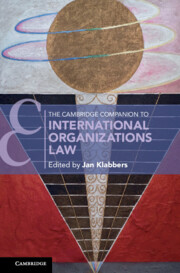Book contents
- The Cambridge Companion to International Organizations Law
- Cambridge Companions to Law
- The Cambridge Companion to International Organizations Law
- Copyright page
- Contents
- Contributors
- Acknowledgements
- Cases
- Introduction
- 1 Beyond Functionalism
- 2 The Concept of International Organization
- 3 Accountability
- 4 Inclusion and Exclusion in International Organizations
- 5 A Legal Framework on Internal Matters
- 6 Standard-Setting in UN System Organizations
- 7 Operational Activities
- 8 Deliberation
- 9 Teaching Statehood
- 10 Interaction between International Organizations
- 11 The International Organization for Migration and the Duty to Protect Migrants
- 12 Global Health
- 13 Energy Provision
- 14 International Organizations, Disarmament and State Behaviour
- 15 International Organizations and Stories of Development
- 16 Food Security and International Organizations
- 17 Financial Stability
- Epilogue
- Bibliography
- Index
1 - Beyond Functionalism
International Organizations Law in Context
Published online by Cambridge University Press: 31 March 2022
- The Cambridge Companion to International Organizations Law
- Cambridge Companions to Law
- The Cambridge Companion to International Organizations Law
- Copyright page
- Contents
- Contributors
- Acknowledgements
- Cases
- Introduction
- 1 Beyond Functionalism
- 2 The Concept of International Organization
- 3 Accountability
- 4 Inclusion and Exclusion in International Organizations
- 5 A Legal Framework on Internal Matters
- 6 Standard-Setting in UN System Organizations
- 7 Operational Activities
- 8 Deliberation
- 9 Teaching Statehood
- 10 Interaction between International Organizations
- 11 The International Organization for Migration and the Duty to Protect Migrants
- 12 Global Health
- 13 Energy Provision
- 14 International Organizations, Disarmament and State Behaviour
- 15 International Organizations and Stories of Development
- 16 Food Security and International Organizations
- 17 Financial Stability
- Epilogue
- Bibliography
- Index
Summary
Even the most casual observer of international organizations must at times be puzzled. It is puzzling to realize, for instance, that regardless of the public outcry over nasty acts done on the watch of some international organization or another, nothing ever seems to happen: accountability is much-discussed, but rarely materializes. It is somewhat mystifying that for all the discussion of the reform of international organizations and of their policies, and for all that these are often amended, nothing much ever seems to change. Likewise, few international organizations have lawmaking powers properly so-called, and yet international organizations seem to be highly influential. By the same token, international organizations often engage in co-operation with one another without anyone noticing it, and seemingly without having strong authorization to do so. And it must be puzzling to realize that the law tends to treat all international organizations in much the same way, regardless of whether they work for the global common good or are better seen as interest groups for a particular group of states; regardless of whether they serve a global cause or manage a particular industry; and regardless also of the sort of activities they engage in – whether they occupy themselves with questions of peace, security and disarmament or are, effectively, institutions of higher learning set up as international organizations.
- Type
- Chapter
- Information
- Publisher: Cambridge University PressPrint publication year: 2022
- 1
- Cited by

